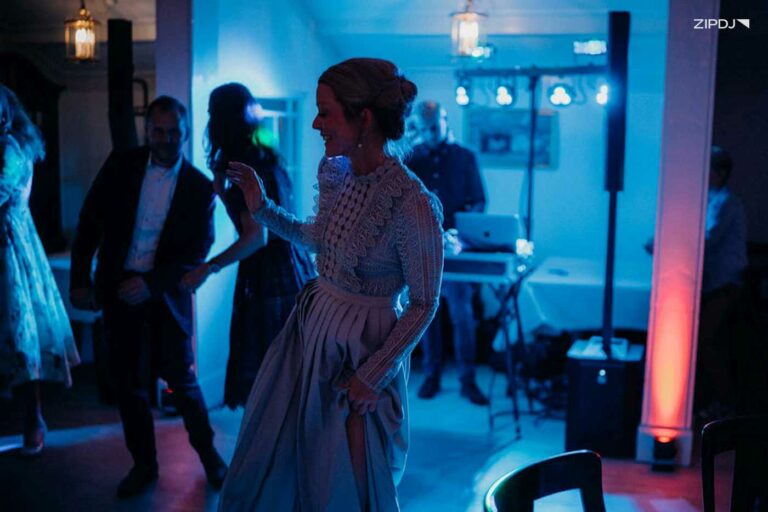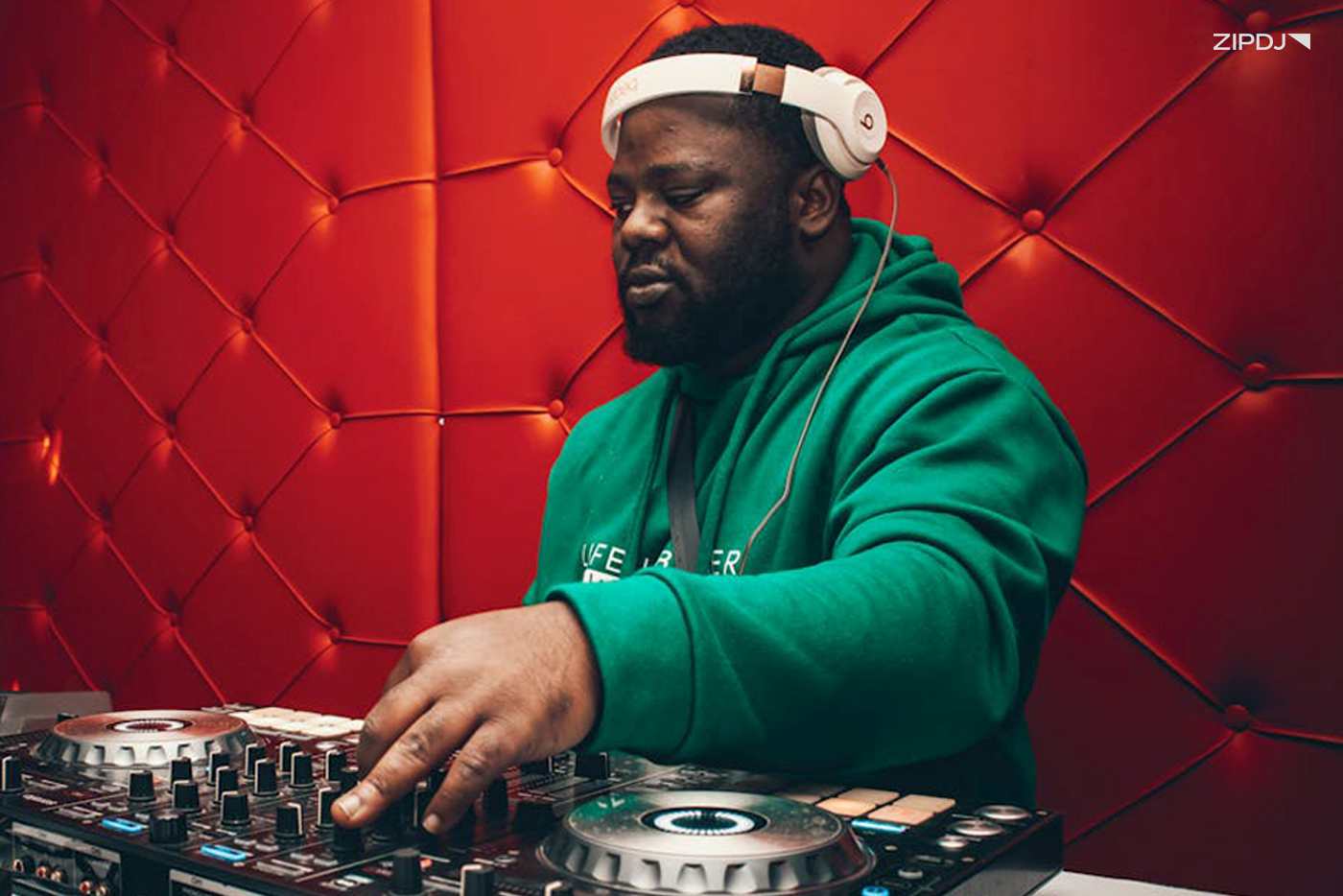How To Start A Wedding DJ Business In 2025

Earning good money as a DJ is challenging, but providing various DJ services in high demand can help diversify income streams.
A popular way to achieve this is by establishing a professional wedding DJ business, which provides a memorable experience for the wedding couple.
In this article, we’ll discuss how to launch a wedding DJ business, from building a website to finding clients.

How To Start A Wedding DJ Business In 2025 (Step-By-Step)
Whether running an established DJ company or new to the game, a wedding DJ business is a great way to establish a steady income stream.
Here are ways to launch your business, reach potential customers, and provide the best entertainment of the day.
Step 1: Research Other Wedding DJs
One key to success is competitor research. It involves evaluating how other DJs market their wedding services and engage the crowd to keep the dance floor entertained.
You can start by searching for local wedding DJ businesses and reviewing their DJ services, pricing, and overall presentation.
Take down notes of anything that looks appealing to potential customers, such as optional extra services and ways to stand out from the competition.
Likewise, you can study how famous DJs perform at weddings, gathering ideas to position yourself as the top choice for wedding couples.
Just as important, research how much other DJs make for their gigs and how they structure their prices and packages for clients.
This information can be combined with a list of local wedding venues, which you can contact to discuss becoming a DJ for upcoming events.
If any family or friends are getting married, attend the wedding to observe the DJ and talk to them about their challenges so you can stay one step ahead.
Find the perfect closing tracks with ZIPDJ’s music library.
Step 2: Invest In The Right Wedding DJ Equipment
DJing at weddings requires various equipment, including a DJ controller and compatible DJ software, lighting, smoke machines, and other optional gear.
While some venues supply sound systems and other equipment, if you’re a professional wedding DJ, you’ll need the complete system to cover all eventualities.
Wedding DJs aren’t typically expected to perform intricate mixing or scratching, so a controller or a laptop and mixer combination is often sufficient for a gig.
If you use top-of-the-line equipment, your DJ insurance costs and premiums can increase if guests spill drinks on your setup or something equally drastic happens.
You should also invest in backups of accessories, such as headphones, microphones, and power cables, just in case something breaks mid-set.
Some DJs structure their pricing based on the equipment provided, offering higher-priced packages that include add-ons like photo booths and other extras. Others charge based on the event duration, venue size, or additional services such as custom playlists and lighting effects.
Step 3: Hone Your Wedding DJ Skills
Learning how to DJ a wedding requires more than knowing how to smoothly blend two tracks, with clients expecting a more rounded package.
This presentation starts with how you engage with guests, from taking song requests to adjusting the mood for cocktail hour.
If you offer MCing services as part of your packages, you should dedicate time to practicing your tone of voice for announcements and other situations.
From a technical perspective, wedding DJs don’t perform extended transitions, and mastering quick cuts between songs is a valuable skill for quickly changing playlists.
Mastering high proficiency with your gear’s features and deep familiarity with your music library are also essential skills.
Ultimately, the better your DJing and overall presentation, the higher you can set your DJ rates through positive feedback from your customers.
Step 4: Create A Detailed Business Plan
Creating a business plan for a wedding DJ business is essential if you’re looking for investment. Even without investors, it can still help clarify various vital factors.
A wedding DJ business plan starts with an executive summary outlining your concept and unique value proposition for your target market. The summary should also define how your business will be positioned to offer superior services to your competitors.
This plan should cover your marketing strategy, the budget needed for equipment, and cost analysis to ensure your proposed fees lead to profitability.
Financial management processes and record-keeping for tax purposes are also crucial to keeping everything organized. Tracking expenses such as clothing, music purchases, and fuel costs helps optimize your real income.
It can also be a valuable reference point when drafting a DJ contract for a specific customer, allowing you to tailor the terms and conditions for an agreed fee.

Step 5: Set Up A Wedding DJ Website
A company website is as essential today as business cards once were. It provides potential clients with access to all the information they need about services.
Setting up a website doesn’t have to be expensive. You can create one on a budget that includes photos, videos, service fees, and contact details.
It’s also a powerful resource for directing people to your social media channels, where you can engage with your audience by discussing music and other topics.
Design and build yours based on the best DJ websites you found. Make sure to include important elements, such as booking forms.
Site optimization should also be performed, including using relevant keywords for search engine optimization and uploading high-quality media assets.
Once you’ve started performing at weddings, update the website to include client testimonials and add social proof to build a strong reputation.
If you use photos or videos from events, ensure you have permission from the client, or avoid using media that shows the guests.
Essential reading: Find out how much wedding DJs charge.
Step 6: Build A Collection Of Appropriate Music
It’s not uncommon for couples to rely on streaming services for music on the big day, which has negatively impacted professional wedding DJs.
While streaming services pose a challenge, a wedding DJ can offer much more, keeping the dance floor active in a way that a Spotify playlist cannot.
This advantage begins with an encyclopedic knowledge of popular music and understanding which songs complement one another at a moment’s notice.
The ability to organize your music library is vital for DJing at weddings, particularly if you’re open to spur-of-the-moment requests from guests.
If you’re taking the old-school approach and spinning vinyl, you can build your collection on a budget through thrift stores and eBay sellers.
Most wedding DJs use digital file formats, which can be tagged in DJ software to make songs easy to find whenever a guest requests them.
Additionally, a music library should include an eclectic selection of popular closing songs, particularly ones with well-known lyrics, so your audience can join in on the fun.
As you gain more experience performing at professional gigs, you can refine the collection to include songs that elicit positive responses from the guests.
Step 7: Start Marketing Your Wedding DJ Business
Whatever type of business you’re running, marketing and promotion are key to transforming a great concept into a viable money-making venture.
Promoting a wedding DJ business can be done in various ways, from using your social media presence to handing out flyers.
Traditional print media advertising, such as local newspaper ads, can be a powerful method for finding local couples who are ready to marry.
Using social media, particularly Facebook and Instagram, can also drive awareness through targeted ads based on your location.
You can also promote your business to venues and booking agents, sharing details of your wedding DJ services to gauge interest.
Aim to create promotional materials that capture the vibe of a wedding, using bright colors, elegant fonts, and high-resolution images.
Lastly, remember word of mouth. Speak to other wedding DJs for advice and to build relationships with venue owners.
Step 8: Engage With Potential Clients
Once you receive requests for your services, you can begin discussing the details to tailor your services to the client’s expectations for the event.
Likewise, if you’re reaching out to wedding vendors to build awareness of your brand, discussing your services can help you refine your DJ proposal template.
Unlike club DJs, who are free to decide what they play, wedding DJs are confined to the music taste and specific songs from the wedding couple.
While some wedding DJs include lists of non-negotiable songs, most are expected to include requested songs from the event organizers whenever possible.
Engaging with customers can also clarify essential factors, such as the dress code and key moments in the schedule for announcements and other activities.
Most importantly, negotiating with clients in good faith will ensure a great working relationship and another glowing reference for your site.
Step 9: Perform Your First Wedding Gig
Landing your first wedding gig is the result of all your hard work and an opportunity to showcase your skills as a DJ and performer.
Start by professionally presenting yourself at the venue, setting up your DJ equipment, and coordinating with the client to ensure everything runs smoothly.
Once the music is playing, read the crowd’s energy and adjust your set accordingly while maintaining proper DJ etiquette at all times.
Use the gig as an opportunity to network with guests, engaging them when appropriate and projecting a warm, welcoming personality.
If permitted by the client and venue, you can leave business cards on tables or display a banner on the DJ booth to promote your wedding DJ services.
As with any DJing style, delivering an exceptional performance involves a learning curve, so note any issues you can address in the future.
Most importantly, enjoy yourself and create a party atmosphere that keeps guests engaged and leaves a lasting impression on your service.
Step 10: Gather Feedback & Improve
Once you’ve completed each wedding DJ gig, gather feedback to learn from your mistakes and improve your services.
This insight can help you improve what you wear at weddings, how you set up the DJ booth, and the general protocols for collaborating with venues.
Constructive negative feedback should be welcomed and taken on board, while positive feedback can be used for website testimonials.
Feedback can also help improve technical issues, such as poor-quality audio or low microphone volumes, that prevent guests from hearing announcements.
This foresight will allow you to reinvest in your wedding DJ business wisely, improving your workflow and the overall client experience.
Your website can include options for customers to leave feedback, while social media provides another great platform for engaging in conversations.
If necessary, create a spreadsheet of strategies for improving your business model and check them off as you implement them.
Wedding DJ Business Checklist
Starting a wedding DJ business involves many steps, and for a detailed guide, check out this comprehensive wedding DJ checklist.
Here are some examples of activities on your wedding DJ checklist to maximize your chances of success:
- Shadow other DJs: If you know another wedding DJ who would be willing to be observed at a gig, tag along and observe how they manage the process.
- Create a customer questionnaire: Preparing a quick questionnaire to hand out at events is a great way to optimize feedback and refine your business.
- Invest in better equipment: Once you start earning money from wedding DJ gigs, reinvest in better equipment and backups for emergencies.
- Follow popular music trends: The best wedding DJs have their finger on the pulse of popular culture, so follow trends to keep your playlists up to date.
- Build networks with other vendors: Weddings involve various services, and forming relationships with florists, caterers, photographers, and planners can help you secure more gigs.
- Pre-record mixes: Performing at a wedding can take several hours, so having a pre-recorded mix will help when taking bathroom breaks.
As you gain more experience in the wedding DJ industry, you can expand your checklist to include new methods for streamlining processes.
Read more about ZIPDJ’s pricing.
Summary
Setting up a wedding DJ business is a great way to earn money doing something you love without giving up your day job.
Following the above guidance and performing additional research will ensure your venture is launched with the best chances of success.
As your business grows, you can contact other vendors and use these connections to book more weddings, ensuring the success of your DJ company.
Not a member ?
Join Today for Unlimited Music Downloads. Visit zipdj.com for more information.



